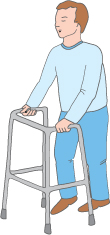Definition and causes of Nerve inflamation - Polyneuropathy

A tripod is a usuful
support as the legs
are often affected.
Nerve Inflammation is a group of diseases that affect the peripheral nervous system, which means that part of the nervous system, located outside the brain and spinal cord. The term inflammation may be somewhat misleading, since there is not as such any real inflammation. The autonomic nervous system is the part of the nervous system that cannot be controlled consciously and in particular govern the functioning of the internal organs, may also be affected by nerve inflammation. Characteristic of nerve inflammation is the loss of tactile sense, muscle force and reflexes.
Nerve inflammation occurs because of damage to the nerve cell or one of its proliferations (axons). The nerve cell can be damaged by for example Polio, the herpes viruses, lack of oxygen, or antibodies circulating in the blood and in some forms of cancers such as lung cancer. The axon can be damaged by a mechanical trauma for example cuts and a host of diseases can damage especially the farthest part of the axon i.e. the nerve ends in the body's tissues. This is visible for example in:
- Diabetes.
- Chronic renal failure.
- Vitamin deficiencies (Especially B-vitamin).
- Treatment with certain types of medication (certain antibiotics, amiodarone, chemotherapeutic agents, high doses of B12B6 or tryptophan).
- Longstanding alcohol abuse (see also Alcohol Dependence).
- Decreased activity in the thyroid gland.
In addition, there are certain hereditary and immune mediated forms of nerve inflammation. These primarily affect the axon’s fatty sheath of myelin. A special type of nerve inflammation is immune mediated Guillain-Barres syndrome which is a potentially fatal disease where the immune system following an infection mistakenly being to attack the body’s nerves.
Symptoms of nerve inflammation
Often the symptoms begin furthest from the center of the body, usually in the feet. The symptoms usually develop slowly over several years. An exception is Guillain-Barres syndrome which develops very suddenly, within hours to days, and at worst can paralyze the breathing muscle – the diaphragm.
Generally, the symptoms are:
- Sensory impairment with a feeling of walking on cotton. First lost is the vibration sensation and then the ability to distinguish between pointed and blunt objects and finally the posterior sense of the joints.
- Muscle force can also be reduced, and muscle wasting (atrophy) becomes visible.
- Unstable walk and motoric trouble particularly connected with handling small objects such as tools or writing tools. This may be due both the reduced tactile sense and the reduced muscular force.
- Burning, stabbing pain.
- The autonomic nervous system is affected, resulting in rapid blood pressure decrease when standing up called orthostatic hypotension (see also Low blood pressure, impotence, Urination problems and modified sweat pattern).
Precautions and diagnosis
With slowly developing symptoms consult your doctor, who then can refer for specialist examination. Suddenly emerging symptoms require medical attention right away for example by transfer to the nearest emergency room.
The nerves ability to transmit nervous impulses can be examined by a neuro-physiological examination to determine if the nerve inflammation has caused damage to the axon or to the myelin around the axon. Sometimes a biopsy is performed taking tissue from a particular nerve in the leg (n. suralis). Blood samples are taken to determine if there is an underlying disease. If Guillain-Barres syndrome is suspected a lumbar puncture is performed to draw a cerebrospinal fluid sample for analysis.
Treatment of nerve inflammation
The immune mediated forms of nerve inflammation can be treated by cleaning the patient's blood of harmful immune substances in a machine or give high doses of immunoglobulin, adrenal cortical hormones or certain types of chemotherapy.
Otherwise, it is very much a question of eliminating or reducing the trigger factors for example by monitoring the blood sugar closely, stop a possible excessive alcohol consumption, provide B vitamins, refrain from taking certain types of medication, giving medicine raising the metabolism and so on.
Pain from the nerves is best treated with drugs that are usually used to treat depression or epilepsy.
Complications and outlook
The outlook depends largely on the type of nerve inflammation involved. However, the disease generally continue to develop and particularly so if the triggering cause is not removed or treated. Guillain-Barres syndrome is a potentially fatal disease because it can paralyze the breathing muscle – the diaphragm.
Przeczytaj ten artykuł w języku polskim |